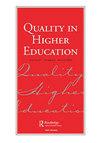创新、专业化和评估:高等教育质量管理的启示
IF 1.5
Q3 EDUCATION & EDUCATIONAL RESEARCH
引用次数: 2
摘要
乍一看,讨论创新、专业化和评估对高等教育质量管理的相关性似乎是多余的。人们可以合理地期望大学对创新友好,在教学方法上追求专业化,并对基于可靠评估研究方法的循证管理实践表示赞赏。然而,再看一眼,事情就变得模糊了。例如,高等教育领域的评估实践,其重点是预定义的质量指标,在最坏的情况下会阻碍教学创新,这需要更多的开放性和容错性。因此,本文将创新、专业化和评估作为相互关联的概念进行了讨论,在最好的情况下,这些概念可以为适应性和敏捷的质量管理环境做出贡献,这种环境对上下文敏感,并在所采用的机制和负责执行它们的人之间建立信任。本文章由计算机程序翻译,如有差异,请以英文原文为准。
Innovation, professionalisation and evaluation: implications for quality management in higher education
ABSTRACT At first sight, discussing the relevance of innovation, professionalisation and evaluation for higher education quality management seems to be redundant. Universities can legitimately be expected to be innovation-friendly, to pursue professionalism in their approaches to teaching and to be appreciative towards an evidence-supported management practice that relies on sound evaluation research methods. At second sight however, things prove to be blurry. For instance, evaluation practice in the field of higher education, with its focus on predefined quality indicators can in the worst case impede teaching innovation that requires more openness and error-tolerance. The paper thus discusses innovation, professionalisation and evaluation as interrelated concepts that can in the best case contribute to an adaptive and agile quality management environment which is context sensitive and creates trust in the employed mechanisms and those who are in charge to perform them.
求助全文
通过发布文献求助,成功后即可免费获取论文全文。
去求助
来源期刊

Quality in Higher Education
EDUCATION & EDUCATIONAL RESEARCH-
CiteScore
3.30
自引率
14.30%
发文量
32
期刊介绍:
Quality in Higher Education is aimed at those interested in the theory, practice and policies relating to the control, management and improvement of quality in higher education. The journal is receptive to critical, phenomenological as well as positivistic studies. The journal would like to publish more studies that use hermeneutic, semiotic, ethnographic or dialectical research as well as the more traditional studies based on quantitative surveys and in-depth interviews and focus groups. Papers that have empirical research content are particularly welcome. The editor especially wishes to encourage papers on: reported research results, especially where these assess the impact of quality assurance systems, procedures and methodologies; theoretical analyses of quality and quality initiatives in higher education; comparative evaluation and international aspects of practice and policy with a view to identifying transportable methods, systems and good practice; quality assurance and standards monitoring of transnational higher education; the nature and impact and student feedback; improvements in learning and teaching that impact on quality and standards; links between quality assurance and employability; evaluations of the impact of quality procedures at national level, backed up by research evidence.
 求助内容:
求助内容: 应助结果提醒方式:
应助结果提醒方式:


